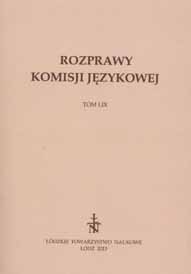POLONIZMY W „PROSTEJ MOWIE” XVIII WIEKU
THE POLISH FEATURES IN “PROSTA MOVA” IN 18TH CENTURY
Author(s): Joanna GetkaSubject(s): Language and Literature Studies
Published by: Łódzkie Towarzystwo Naukowe
Keywords: the Basilians; printing; typography; “prosta mova”; 18th century; Ukrainian language; Polish language
Summary/Abstract: This article applies to Polish language features in “prosta mova” (understood as spoken and written Ukrainian language in 18th century). The subject of the study is a relic of Ruthenian literature titled Nauki Parochialnija… edited in Pochajov Lavra in 1794. According to the author’s (Julian Dobrylovski) assumption, language of the piece, close to simple – spoken language was supposed to be understandable for believers of Greek Catholic Church. Nauki... are written in the language close to simple, spoken one. Thanks to this Nauki... is the remarkable material for the analysis of factual state of language in the century it was created in. The influence of Polish language is visible in phonetics, morphology as well as in lexical level. Since, however, both in phonetics and morphology, they are not systemic (mainly manifest themselves in lexical borrowings), particular attention was paid to the analysis of the language vocabulary. Method used in the study (selection of translated phrases with conjuction чили) allows to confirm the observations on the language of the seventeenth-century Russians, for whom the Polish language was more understandable than “slavic”. The analysis also showed that the influence of the Polish language which has characterized the old Ukrainian language, was continued thereafter. What’s more, its effects are permanent and this is reflected in the modern Ukrainian language. The presence of Polish layer in Nauki... can be explained by the orientation of Dobrylowski on the language of the dominated in the region culture and the influence of Polish language on Ukrainian and Belorussian languages from ancient times. The analysis of Nauki... language has a capital meaning in the studies of literature Ukrainian language development. It fulfills already existing notices and language description of the period of their creations with the religious, pulpit literature work.
Journal: Rozprawy Komisji Językowej
- Issue Year: 2013
- Issue No: 59
- Page Range: 45-59
- Page Count: 15
- Language: Polish

